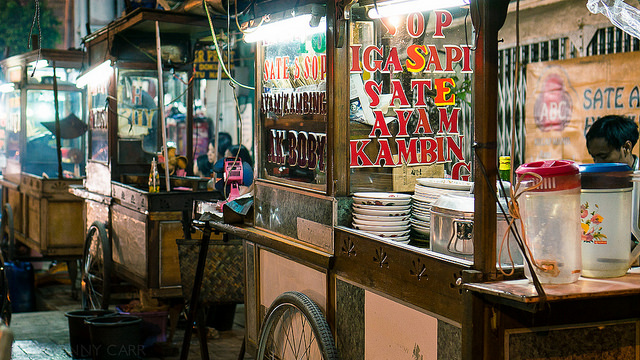Pat Walsh's book of short stories and poems takes us through a year of intimate encounters with Jakarta
Nur, homing pigeon
Nur sells snacks on an elevated pedestrian walkway that spans a six lane highway in south Jakarta called Jalan Arteri by taxi-drivers. Like the captain on the bridge of a large ship, she commands a sweeping view of the human tide that surges up and down these swollen arteries but she has no desire to join them. Her heart is in her village in central Java. That, I learned, is what brings her to this spot for several hours each day.
I got to know Nur during my daily crossings to buy a newspaper at a kiosk on the other side of Arteri. Apart from two homeless boys who bedded down on the bridge some nights, a cardboard box between them holding a few coins and notes, she was the only regular occupant of the bridge. Her point of sale was strategically chosen near four sets of stairs from which hundreds of pedestrians, including me, spilled on and off the structure in a never-ending stream. It was the perfect spot for an ambush. As it was suicidal to try and cross the busy road at street level, there was no alternative but to clunk one’s way up the metal stairs and cross where the gentle Nur waited, in hope.
Beggars and informal vendors are forbidden in modern Jakarta. Technically speaking, therefore, Nur was breaking the law and taking a risk. Regulars knew where to find her because she occupied the same spot at the same time each day but she was savvy enough to take advantage of Jakarta’s lax policing of local government regulations by limiting her hours, taking up minimal space and keeping to the edge of the walkway to avoid inconveniencing pedestrians and complaints to officialdom.
She’s got away with it for two years which also means it pays, at least enough for her purposes. When I met her, she was already an experienced and confident retailer and keen to try out her English. She is small with teenage looks. Only her face is visible, enclosed by her jilbab in an oval frame like an old photograph, but illuminated with a disarming smile. Nur means light in Arabic. At first I thought she was a school girl earning pocket money during the long break but she turned out to be 27 and married with a child.
Her specialities are two traditional snacks popular with Javanese. She makes them at home with the family somewhere in the maze of a huddled village kampung a walk away.
One, called rempeyek, a savoury cracker, is about the size of a small pizza but irregular in shape, made from spiced batter topped with anchovies and peanuts. The other comprises singkong (cassava) chips dipped in red sambal that stings the tongue. Both are packaged in clear plastic to keep them fresh for up to three weeks.
The family make about 20 of both snacks at a time. Untungnya (luckily), Nur says, she will sell five of each per day. I pay Rp10,000 (1 dollar) for one packet of each item which boosts her earnings up to about $5 on the days I pass by. Nur probably thinks I am a great fan of both, but the truth is I pass them on to the local ojek and security boys to have after 6 pm when they are breaking their Ramadan fast.
"Why are you selling snacks?" I ask, shouting to be heard above the traffic thundering below.
"For mudik, so I can go home to central Java for Idul Fitri after the fast," she yells in reply.
So there it is in a single word. Mudik is what drives Nur. Like the many in Jakarta who migrate home annually, dressed to impress and loaded with presents, Nur has the homing instinct imprinted in her DNA like a pigeon. Its pull is so strong she is prepared to risk a brush with the law, endless hours of occasional chance sales, and an invariably long, tedious and expensive round trip home and back. During mudik, urbanised Jakartans both rejoice at the slower pace of life and complain at the absence of domestic staff.
But Nur, like millions of others, owes no deep allegiance to Jakarta. She remains a villager, her identity and loyalties defined by her family, ethnicity, birth place and religion. She’s a bird of passage that alights on a bridge to feed on the crumbs in someone else’s world.
A perfect lunch break
Book in hand burning
I take chicken soup
The colour of an outback dam
Drained to its dregs
And a bowl of snow white rice
Flecked with insect wings of onion
Browned on a gushing stove
And with my right hand
Feed my body and the left
My hungry mind.
Eating at a warung in Tebet, Jakarta, after arriving by plane from Melbourne in 2014.
Pat Walsh (padiwalsh@gmail.com) co-founded Inside Indonesia in 1983 with John Waddingham. Pat is a prominent human rights activist and former adviser to the East Timor Commission for Reception, Truth and Reconciliation (CAVR).











